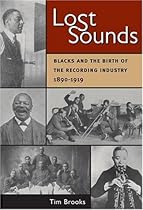Read Lost Sounds: Blacks and the Birth of the Recording Industry, 1890-1919 by Tim Brooks, Dick Spottswood Online
Read [Tim Brooks, Dick Spottswood Book] # Lost Sounds: Blacks and the Birth of the Recording Industry, 1890-1919 Online ! PDF eBook or Kindle ePUB free. Lost Sounds: Blacks and the Birth of the Recording Industry, 1890-1919 Updating History DLibrarian This is an excellent addition to the study of African American history, So many of the facts presented are those that not even the "seniors" knew. I have used this book to include information in lectures and class settings.. No library shelf should be without it AfroAmericanHeritage A few pages into this book, one realizes the title is a double entendre. The recorded sounds documented here - which include popular music, ragtime, jazz, cabaret, classical, spoken word,

| Title | : | Lost Sounds: Blacks and the Birth of the Recording Industry, 1890-1919 |
| Author | : | |
| Rating | : | 4.59 (981 Votes) |
| Asin | : | 0252028503 |
| Format Type | : | paperback |
| Number of Pages | : | 656 Pages |
| Publish Date | : | 2013-12-19 |
| Language | : | English |
Updating History DLibrarian This is an excellent addition to the study of African American history, So many of the facts presented are those that not even the "seniors" knew. I have used this book to include information in lectures and class settings.. No library shelf should be without it AfroAmericanHeritage A few pages into this book, one realizes the title is a double entendre. The recorded sounds documented here - which include popular music, ragtime, jazz, cabaret, classical, spoken word, politics, poetry, and more - are not merely "lost" in the sense that their existence has been uncelebrated. They are also in danger of being lost to us forever if imm. A colorful look at a forgotten era G. Mac What a delight this thick book is, and what a challenge to describe adequately in a few sentences."Lost Sounds" is a detailed look at an aspect of the American music industry that is not just forgotten; it seems never to have been fully appreciated -- the early years of recorded music, with an emphasis on the essential contribution made by African Amer
The sounds they preserved reflect the actual emerging black culture of that tumultuous and creative period. Handy, James Reese Europe, Wilbur Sweatman, Harry T. Because they were viewed as novelty or folk artists, nearly all of these African Americans were allowed to record commercially in their own distinctive styles, and in practically every genre: popular music, ragtime, jazz, cabaret, classical, spoken word, politics, poetry, and more. Washington, and boxing champion Jack Johnson, as well as a host of lesser-known voices. Brooks assesses the careers and impacts, as well as analyzing the recordings, of figures including George W. Burleigh, Roland Hayes, Booker T. T history of the recording industry, as well as the racially complex landscape of p
"Tim Brooks has drawn on a staggering array of primary sources to create this wonderful compendium of information. Lost Sounds makes a significant contribution to the field."
Dick Spottswood is a freelance author, broadcaster, and record producer. Tim Brooks is Executive Vice President of Research at Lifetime Television. He is coauthor of The Complete Directory to Prime Time Network and Cable TV Shows and The Columbia Master Book Discography, and the author of Little Wonder Records: A History and Discography. He is the author of the seven volume reference work, Ethnic Music on Records. He is past president of the Association for Recorded Sound Collections and
Download Lost Sounds: Blacks and the Birth of the Recording Industry, 1890-1919
Download as PDF : Click Here
Download as DOC : Click Here
Download as RTF : Click Here
